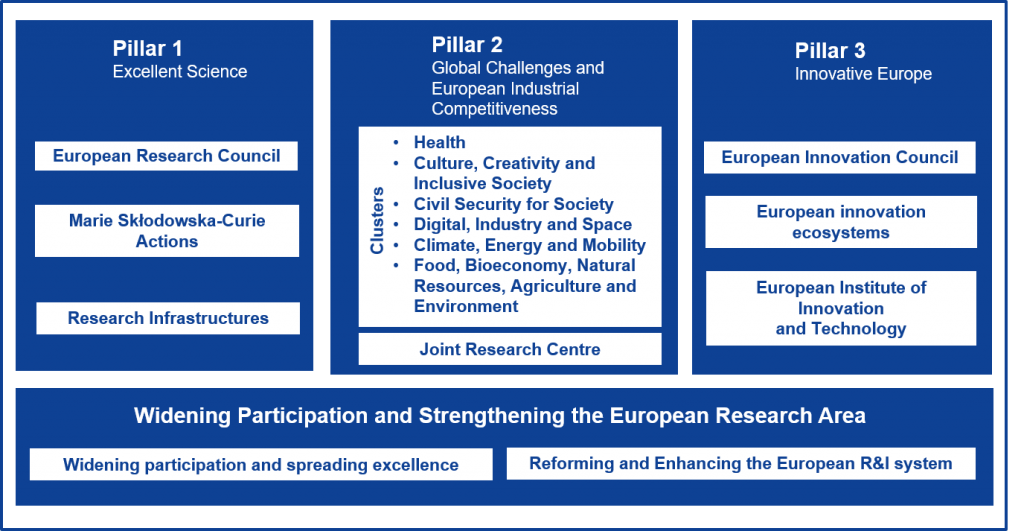Reflecting on Horizon 2020: why we’re glad the UK will participate in Horizon Europe
 On 24th December, the UK Government announced that it had reached a post-Brexit agreement with the EU, following months of negotiations. Since then, we have learnt that the UK will have ‘Associated Country’ status in Horizon Europe, the EU’s €95.5 billion programme for research and innovation. This means that the UK will participate fully in the new programme.
On 24th December, the UK Government announced that it had reached a post-Brexit agreement with the EU, following months of negotiations. Since then, we have learnt that the UK will have ‘Associated Country’ status in Horizon Europe, the EU’s €95.5 billion programme for research and innovation. This means that the UK will participate fully in the new programme.
The UK’s participation is subject to a financial contribution from the UK Government to the EU budget, leading many to question whether association to Horizon Europe is worth it. To answer this pressing question, we have reflected on the UK’s performance in Horizon 2020, the 7-year programme that preceded Horizon Europe. You can read our key findings below:
The UK has a strong track record
- The UK received more than €7 billion of Horizon 2020 funding. This is equivalent to just over 12% of the programme’s total budget. Only Germany was more successful. However, Germany funded a higher percentage of the overall EU budget, contributing 20.9% compared to the UK’s 20.9%.
- In total, 16,123 British organisations were involved in Horizon 2020 projects. This includes 2829 SMEs, who received a total of €924.4 million. The success rate for UK organisations was 14.77%, much higher than the EU average of 11.9%.
- The UK received the highest number of grants from the European Research Council. Around 1/5 of grants were awarded to researchers at UK institutions. The University of Oxford, University of Cambridge, and University College London all feature in the top ten most successful research units.
Associated countries performed well in Horizon 2020
So well, in fact, that some associated countries outperformed their EU counterparts. For example, Switzerland secured €2 billion from the programme, outperforming countries including Austria, Greece and Ireland. It also received a larger number of ERC grants than some much larger EU countries, including Italy and Spain. Therefore, it is clear that Associated Country status was not a barrier to success.
The numbers show that UK businesses and researchers performed extremely well in Horizon 2020. In particular, it is impressive that UK SMEs received more than €900 million from the programme! This is a great source of funding for all involved in UK research and innovation and we look forward to seeing the opportunities that arise from Horizon Europe.
If you have any questions about Horizon Europe, please get in touch. Alternatively, subscribe to our free monthly newsletter to receive the latest news and opportunities direct to your inbox.
Sources: Horizon 2020 Country Profile, Nature and Wellcome Trust.
European Innovation Agencies Make Plans to Strengthen Innovation
The European Innovation Council (EIC) and the European Institute of Innovation and Technology (EIT) have signed a letter of intent to coordinate efforts and strengthen Europe’s innovation services, pledging to build a “more integrated and inclusive EU innovation ecosystem for the benefit of EU innovators.”
Potential areas of cooperation are currently being tested in three €1 million pilot projects. The innovation agencies will finalise their collaboration in Spring 2021, before rolling it out in 2022.
Context
The EIC and EIT are complementary organisations, working towards the shared goal of translating Europe’s research strengths into jobs and growth. However, they operate in different ways:
- The EIT focuses on the integration of higher education, research, and innovation to address global challenges set in Horizon Europe. It has eight designated Knowledge and Innovation Communities, each of which addresses a specific societal challenge.
- In contrast, the EIC provides financial support for innovators. Its focus is on all areas of disruptive and breakthrough market-creating innovation.
A closer working relationship between the two institutions will enable companies from underperforming countries to secure more funding. As a result, this will help narrow the innovation gap between east and west Europe.
Significance
EU research commissioner, Mariya Gabriel, has labeled the move “a stepping stone in creating the European Innovation Area.” It marks a recognition that European innovation is vital. Innovative ideas key to tackling major societal challenges, including Covid-19 and climate change. They can also help Europe regain its position as a world leader in the field of innovation.
Please note: Negotiations are still ongoing to determine the UK's participation in Horizon Europe, the EU's next funding programme for research and innovation. However, UK scientists, researchers, and businesses can still apply for funding from the European Green Deal, the last and biggest call under Horizon 2020. You can read more about this competition here.
Source: Science|Business
European Green Deal: €1 billion available for innovative projects
One of the European Commission’s top priorities is to tackle climate change and make Europe climate-neutral by 2050. As a result, the Commission has launched a €1 billion call for research and innovation projects that respond to the climate crisis. Funded by Horizon 2020, the European Green Deal Call aims to drive Europe’s recovery from the coronavirus crisis by turning green challenges into innovation opportunities.
Due to the urgency of the challenges it addresses, the Green Deal Call aims for clear, discernible results in the short to medium-term, but with a perspective of long-term change. Therefore, there are fewer, but more targeted, larger and visible actions. The focus is on rapid scalability, dissemination, and uptake.
Scope
The projects funded under this call must deliver results with tangible benefits in ten areas. Firstly, there are eight thematic areas reflecting the key work streams of the European Green Deal:
- Increasing climate ambition
- Clean, affordable and secure energy
- Industry for a clean and circular economy
- Energy and resource efficient buildings
- Sustainable and smart mobility
- Farm to fork
- Biodiversity and ecosystems
- Zero-pollution, toxic-free environments
Secondly, there are two horizontal areas: strengthening knowledge and empowering citizens. They offer a longer-term perspective in achieving the transformations set out in the European Green Deal.
Furthermore, we are pleased to confirm that UK scientists, researchers, and businesses are eligible to apply for this funding. UKRI has confirmed that projects will receive funding for the lifetime of Green Deal projects, even if they continue beyond 31st December 2020 (when the UK’s period of transition out of the EU ends).
The closing date for applications is 26th January 2021, with selected projects expected to start in autumn 2021. For our assistance in putting together a competitive proposal, contact us today.
GeneFirst Awarded €2.8m in Horizon 2020 Grant Funding for Rapid Covid-19 Diagnostic
RedKnight are delighted to have supported GeneFirst with its successful application to Horizon 2020, securing the innovative med-tech start-up and its 4 collaborating partners (two SMEs and two hospitals) over €2.8m in grant funding. In total, 144 applications were submitted to the Innovative Medicines Initiative (IMI) competition, of which 8 projects have been selected for funding (6% success rate). The successful projects represent the most promising advances in therapeutics and diagnostics to combat the Covid-19 pandemic.
GeneFirst’s project, entitled RAPID-COVID, aims to clinically validate its innovative multiplex technology in both point of care and high throughput (HTP) settings, which includes testing for SARS-CoV-2. Based in Oxford, GeneFirst provides simple, reliable, and effective molecular solutions to aid the accurate diagnosis of diseases and the improvement of patient management.

As of July 2020, the COVID-19 pandemic has caused over 11 million infections globally, claiming more than 500,000 lives. In response to the current outbreak, a rapid and definitive diagnosis of the specific SARS-CoV-2 is crucial. A recent study has shown that 5.8% of SARS-CoV-2 infected and 18.4% of non-SARS-CoV-2-infected patients had other concurrent pathogen infections. Therefore, single target testing is not optimal; failure to distinguish between different pathogens may lead to unnecessary antimicrobial use, cross-infection of mis-grouped patients, and further spreading of the infection.
Simple, sensitive, and multiplex detection of all respiratory pathogens is technically challenging. In response to the need for faster and better detection of multiple respiratory pathogens, GeneFirst has developed a prototype using its innovative proprietary technology - MPA (Multiplex Probe Amplification). The prototype will simultaneously detect and differentiate SARS-CoV-2 as well as 30 other common respiratory bacteria and viruses.
GeneFirst’s assay will allow for accurate, cost-effective, and comprehensive diagnoses during the current outbreak, as well as future routine diagnosis. In this project, the consortium aims to analytically and clinically validate this assay on both high throughput and point of care platforms. This strategy provides maximum flexibility for screening and triage, allows better and faster care, alleviates pressures on healthcare systems, and improves patient recovery rates.
Dr Winnie Wu, COO at GeneFirst, said of the success,
“We are ecstatic with this outcome and all consortium partners are very excited to start the project. For an SME, securing this funding allows GeneFirst to further its R&D and to deliver these crucial diagnostics at scale and pace in time for the winter season. We have pulled together a great project team for the delivery.
We credit our bid success to the RedKnight team; without their support, we would not have been able to achieve what we did in the short time needed to submit the application. We found RedKnight to be professional and diligent, and it has been a real pleasure working with them. This is our first collaborative opportunity and I am confident that our partnership will continue into the future."
Helping companies grow is RedKnight’s core mission. You can find out more about the types of projects we support here.
The good, the bad and the ugly: How to select the right bid writer
 With grant funding competitions now more competitive than ever, many businesses and research organisations are turning to an external bid writer to win them the funding they need. Of course, some organisations have in-house expertise in this field. However, many organisations struggle to cross the “valley of death”, i.e. the period between establishing proof of concept and validating the technology. They become unstuck and development stalls.
With grant funding competitions now more competitive than ever, many businesses and research organisations are turning to an external bid writer to win them the funding they need. Of course, some organisations have in-house expertise in this field. However, many organisations struggle to cross the “valley of death”, i.e. the period between establishing proof of concept and validating the technology. They become unstuck and development stalls.
Grant funding is one vehicle to overcome this enormously challenging period, but with a typical timeframe of 6 to 10 weeks to develop a strong and robust grant application, it commonly falls to the bottom of the to-do list. Worse still, it may fall off the list altogether!
Obtaining the services of an external bid-writer is a useful means of ensuring your application is developed by an expert eye. It maximises your chance of success and ensures you can concentrate on running your business. However, bid writers come in all shapes and sizes.
There are large firms producing hundreds of applications on an annual basis, where the volume of proposals delivered drives a large, almost industrial scale business model. Smaller agencies, like RedKnight, are more selective about the proposals they support; they must carefully consider the time commitment required for each application. Then you have freelancers, people who are well versed in the art of writing an application but may struggle with capacity at peak times. Finally, there are organisations that offer bid-writing as a sort of ‘extra-curricular’ activity. Perhaps they were successful with their own application a few years ago and believe their methods can be of use to other organisations.
So, how do you see the wood from the trees? Regardless of the type of bid writer you engage with, it is crucial that you ask the right questions when you establish that initial engagement. We recommend asking the following key questions:
1. What is your business model?
Several commercial models operate in the sector. Some charge an upfront fee and no success fee, while others offer no-win no-fee. Additionally, some deliver based on a daily rate, whilst others have fixed fees. Different models will work for different businesses. Businesses should remember that bid writing for applications to Innovate UK and Horizon 2020 takes an enormous amount of time and effort. You should obtain a few quotes from 3 or 4 bid writers before proceeding. A word of caution – the cheaper the price, the more work you may end up doing yourself.
2. What is your success rate?
This is a standard question to ask any bid writer, and they should be able to provide you with an accurate figure without too much pause for thought. If they cannot give you a figure, it is probably worth moving on. Too high, and it might be too good to be true. It is not just the success rate of the bid writer that should interest you, but also the success rate of the competition. Some programmes are less than 5% whereas others can be as high as 25%.
3. Can you give me an example of a recent successful project you have supported?
Once you have enquired about the bid writer’s success rate, assuming they give you a figure, you can delve a little deeper and ask for recent examples of success. Do not fall for the old “sorry, I’m under NDA” trick. Any successful bid writer can give a general overview of some of their successful work. After all, isn’t that why we do what we do?
4. Can I have the contact details of those case studies, please?
As the saying goes, you want to hear it from the horse’s mouth. There is no shame in asking for a couple of references who will vouch for the bid writer and the work they have delivered. Try and push for references which best mimic your project. For example, if you’re applying as a single entity to Innovate UK’s SMART Grant, you ideally want to speak with a company who the bid writer supported either as a single entity or to that specific competition.
5. What is your capacity leading up to the deadline?
You will want to make certain that the bid writer is going to be able to support you every step of the way. You are investing in this process and you want to know the person you are entrusting with your application is going to be with you every step of the journey.
6. What is your bid writing process?
Every bid writer will have their own style and approach. At RedKnight, we try and stick to a 3-cycle development process of draft, optimised, final. This way it limits the amount of time the client has to spend reviewing the application, whilst ensuring they have enough contact to flag an issue at an appropriate milestone in the process. Try and find a bid writer whose style fits with your way of thinking.
The above points are by no means an exhaustive list of questions to ask a bid writer, but we’d recommend using them as part of your initial phone call or Zoom meeting. If you are talking with 3 or 4 different bid writers, remembering who had the best success rate and commercial offer can be tricky. Make a table and note the answers to all the above points for each bid writer. You can then cross-reference and come to an informed decision, which will hopefully lead to a successful grant funding application.
To receive expert advice directly to your inbox, sign up to our free monthly newsletter.
Horizon Europe: New Horizons for European Funding
2020 marks the end of Horizon 2020, the EU’s biggest ever EU Research and Innovation programme, which has provided nearly €80 billion of funding over 7 years (2014-2020). Succeeding Horizon 2020, Horizon Europe will run from 2021 to 2027 to ensure that Europe remains a world-class leader in Research and Innovation. The European Commission will invest €100 billion into Research and Innovation that will shape the future of Europe, making it the most ambitious programme of its kind.
“With Horizon Europe, we want to build on this success and continue to make a real difference in the lives of citizens and society as a whole.”
-European Commission Vice-President Jyrki Katainen, responsible for Jobs, Growth, Investment and Competitiveness.
Preliminary Structure of Horizon Europe

Like Horizon 2020, the programme will have three pillars. The first will fund excellence in science, supporting frontier research projects designed by researchers through the European Research Council. The second pillar focuses on Global Challenges and European Industrial Competitiveness. It will support research into societal challenges and reinforce technological and industrial capacities. It also sets ambitious EU-wide missions to tackle some of Europe’s biggest problems, including health and climate change. Thirdly, the Innovative Europe pillar aims to increase Europe’s prowess in market-creating innovation and SME growth through the European Innovation Council.
Following the Horizon 2020 Interim Evaluation, the European Commission has implemented several changes to support Research and Innovation across Europe. For example, they will support breakthrough, high-risk innovation through the creation of the European Innovation Council. This will help innovators to create new market opportunities. Additionally, through the launch of new missions with bold, ambitious goals, Horizon Europe will create more impact across Europe. An open science policy will enable better science through collaborative ways of producing and sharing knowledge and data. Further, an emphasis on widening participation will help low Research and Innovation performing Member States to participate in Horizon Europe.
Despite the uncertainty caused by Brexit, we are hopeful that the UK will remain a part of the Horizon Europe research programme. If you'd like to discuss European funding with one of our specialist advisers, please do not hesitate to contact us today.
To stay updated on the grant funding landscape, sign up to our free monthly newsletter, and receive expert insights direct to your inbox.
